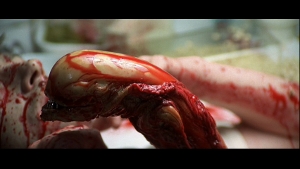
There are three films, more so than any other, that typify modern genre cinema. Ken Begg calls them “template” films, and while that’s a darn good phrase it falls short of describing the true end result of Hollywood’s slavish corpse eating. I hear “template” and I think of this massive assembly line, stamping its slow way to entropy. But the creative process isn’t quite like that. If it were, there’d be a lot more good movies out there.
Instead, for twenty years we’ve drowned in a seemingly endless barrage of rip-offs, plagiarisms, and bastardizations. It’s almost like a virus latched on to hundreds (if not thousands) of creative minds, churning out volumes of absolute shite that then go on to spread and mutate, each time loosing just a little bit more of what made the template what it was to begin with.
Alien is one of those movies you hate to review, but can’t bare to leave unmentioned, in favor of its dismal progeny. You fall into a cycle of Jesus, what could I possibly say about this that hasn’t been said? But that didn’t stop Dubbya, and look where he is now. I hope this will be interesting. Or at least functional.
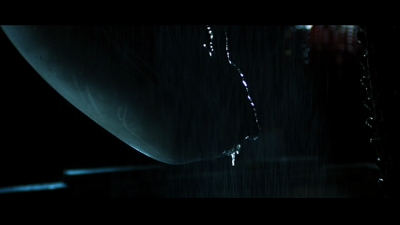
Let’s see. History: Star Wars (Episode 4-A New Hope) came out in 1977, and suddenly Science Fiction was back in black. More than that, it was finally recognized as a genuine money engine. Hollywood looked across America and saw millions of people who’d grown with up cherishing visions of flat-chested heroes blasting giant, rubber monsters with ray their guns. They went to Star Wars (over and over and over…) and got their asses handed to them by a young George Lucus. Two years and one Close Encounters of the Third Kind later, everyone was talking. The Empire Strikes Back was due in a year, as was Star Trek: The Motion Picture. Writer Dan O’Bannon will probably repeat this until he dies, so I’ll help him out: at that time, any script with a space ship was getting the green light. His just happened to be in the right place at the right time. Sometimes it’s that simple, and you really can get that lucky. So stop fucking around on the internet at get back to your script. Put some terrorists in there. I’m sure it’ll be a hit.
It’s one of those ideas that just seems foregone to us now…the sci-fi picture as horror film. Because you have a great old horror movie set up inherent in all space-adventures: a small group of people in a contained space assailed by the unknown. It’s an idea as old as cave dwelling: that any space, which on the one hand shelters, can quickly become a death trap with just a smidgen of bad luck and good old human stupidity.
Thus, Alien.
Instead of my normal thing (the quick, shoot from hip, intro-body-conclusion shtick) I’m going to do this one slow and low. It’s the least this film dissevers after the crimes committed in its name.
Watching it again, especially after this year of hollow studio blockbusters, you realize just how far things have fallen. It’s like New Orleans: dreary and depressing. Which fits perfectly with the tone of this picture. From the first opening shot of the commercial towing space vehicle Nostromo, a vast, unesthetic heap of technology, we know that this is not a fun future.
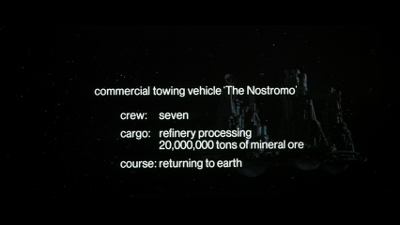
Dan O’Bannon’s phrase is “the used future” (emphasis mine), and we can all thank the gods director Ridley Scott had the depth of vision to appreciate such an idea. Rather than try to top Star Wars and build something even grander, more elegant and strange (like a certain Star Wars creator I could name), we have this geometric hulk of a thing; this space-born oil rig. And after the obligatory pan over its vast and carefully crafted flank, we cut inside.
Welcome to the Nostromo*, bound for Earth after a long haul through the cosmos. After passing over several honey-comb corridors (and pausing as two pre-digital computers yatter at each other) the camera comes to the cryogenics chamber, where our crew wakes from suspended animation…only to discover that home is still quite a ways away. Instead, Mother (the ship’s computer, as voiced by Helen Horton), having detected a transmission from a nearby planet, has woken the crew up early. Company policy dictates that the crew must investigate, or lose their much-talked-about bonuses. So they (grudgingly) alter course.
*[A not-so-subtle reference to the Joseph (Heart of Darkness) Conrad story of the same name.]
Now, everyone and their mother knows this is a bad idea. Even in 1979 I’m sure it sent bells ringing through audience’s heads. But whereas other SFs prop up their stories with some grand cause (“We must do this for science!”) Alien takes a more everyday route and succeeds where others fail, not just in terms of set-up, but in terms of character as well. We hear the crew’s debate around the dinner table and we know these people. They aren’t scientists (save one), they aren’t explorers, and they certainly aren’t adventurers. These are working stiffs long used to a set routine. You do the job, you get paid, rinse, repeat. No deviations. No surprises, save the ugly ones.
After a hard landing (as opposed to the millions of pillow-soft touchdowns in dozens of other sci-fi pictures) damages the ship, our crew finds themselves stranded ’til repairs are complete. With nothing better to do but sit around and smoke*, Captain Dallas (Tom Skerritt), Navigator Lambert (Veronica Cartwright), and XO Kane (John Hurt) decide to kill some time, go EVA, and find the transmission source. Maybe make this whole trip worthwhile.
*[In these health-crazed, risk-free times it seems almost funny. Smoking on a space ship?]
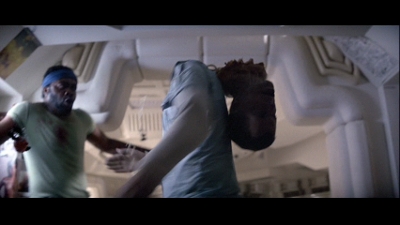
They soon discover this is a planet of surrealist nightmares, complete with its own hulking derelict craft. Inside they find the operator, a desiccated corpse in a gigantic chair straight out of H.R. Giger’s Necronomicon. And then Kane does what we were all waiting for someone to do: he finds a hole in the floor and decides to have a look inside, discovering a Gothic chamber filled with leathery eggs. As everyone in the audience (past, present or future) shakes their heads in frustration, Kane crawls ever-closer to one of those eggs…until its occupant gets even closer (and much more personal) with him.
Despite Warrant Officer Ripley’s (Sigourney Weaver) misgivings, Kane is brought back on board, thing-on-his-face and all. Attempts to remove it are balked by the creature’s death-grip on Kane’s head and its acidic blood. So the crew does the only thing it can: continue repairs and leaving well enough alone.
The Nostromo leaves orbit and, eventually, the creature detaches itself from Kane and dies. Kane wakes a few scenes later. Everything’s fine and dandy, with the crew gathered for one last meal before “bed time.” They’re laughing, joking, eating, smoking…until Kane begins to cough…and gag…and scream. His shirt – hell, his entire chest – bulges outward, before giving way in a marvelous explosion of wet red. Out pops Our Villain, dripping with pieces of Kane’s chest. It snarls once at our crew of stunned humans before scampering away. Then the fun really begins.
Any film, good or bad, rests its weight on a good story, and you can’t get much better than this. As Ridley Scott says, it’s the ol’ “Ten Little Indians” gambit in space. We follow this group of hapless homo sapiens as they wind through their beehive of technology, getting picked off one by one. Certainly nothing new here, right? Hell, we saw this back in ’51 when The Thing From Another World thrilled and chilled an entire generation of bored kids with a little free time and some spendin’ money. Including the likes of John Carpenter, James Cameron…and Dan O’Bannon.
It’s really all in what you bring to the table, especially in film. The execution. If you can think up a good idea, that’s fine, but originality is not required. Still, it’s nice to go back to a time when this plot line. “Hey, let’s put X number of people in a space ship and have them die horrible deaths” still felt like a fresh idea. And it’s nice to see it brought to life so well. But let’s step away from that and talk about the essentials. The ideas.
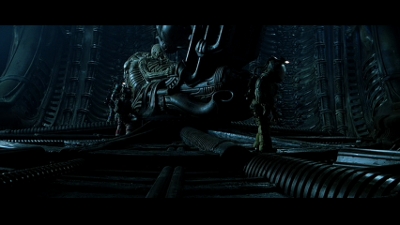
To begin with, there’s the Alien, which sparked a genre-wide revolution in itself. While the aliens of the 50s and 60s were always physically imposing monsters, few had the real umph. Sure, they were nice and all, but they were always aloft from the main characters. Nine times out of ten, killing humans wasn’t even their main objective. Hell, why kill us when you can conquer us with superior technology, mind control, or the help from some fool scientist-collaborator? Even if they did manage to take someone out, the poor sap usually died a quick, bloodless death by strangulation, neck-breaking, or some other low-key way that the censors wouldn’t balk at. There’s the feeling of a threat in some of those old monster flicks, but no real terror. As a result these movies (which were mostly sold as “horror” films) do nothing to scare you and very little to entertain.
Alien solves this problem by crafting one of the most unique monsters in sci-fi history: a living organism with a biology crafted for killing. While other aliens come from without (usually in paper-plate space ships) these xenomorphs come from within, implanting seeds that must eat their way out of the host. So even as they’re born they kill. Death is their sole purpose. I’ll take that over a fifteen-mile-wide flying saucer any day. Which option gives you more shivers?
With a monster like this driving things, a lazier writer would be content to leave it there. To an extent, that’s exactly what Dan O’Bannon and Ronald Shusett did. You watch Alien today and you keep expecting someone to launch into some cliche-ridden expository speech. Something to “define” their character and let the audience “know” them. It seems movies today just have to pause and give everyone a history, regardless of how it plays into anything else.
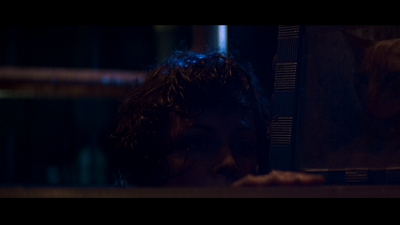
On the other hand, Alien could give less of a shit about its human’s backgrounds. They’re here, now, and there’s a fucking monster on the loose. Who in this situation would stop and take a moment to chat about their childhood? Instead of hurting the film, this decided lack of back story keeps things moving briskly, despite long periods of ad-libed dialogue literally, allowing the characters to define themselves. Chatting back and forth, these working class Joes let us know more about themselves than a thousand rambling, Michael Bay protagonists, keeping us on point through scene after scene of almost literally nothing happening.
Odd seeing this much nothing in a movie, isn’t it? Scott was always a laid back sort of director, and he was in full form on this, his second film. All you first timer’s out there should be prepared for long, lingering shots of characters moving through this vast, yet claustrophobic ship of theirs. That feeling in your gut, that crawly sensation? It’s called “tension” and it’s what happens when a director doesn’t cut away, whip-pan, or wipe every two seconds. Instead, Scott’s camera feels like a floating eye roving through the abattoir of the Nostromo.
There’s no flash, no pop, no bang. This movie doesn’t work on bangs. Alien’s strengths come from darkness misdirection. That feeling that the monster is out there, crawling around the vents…waiting…hell, it could be anywhere.
And yet, Alien avoids the hair-pulling practice of off-screen teleportation. Scott assures this by providing a good sense of the size and geography. This is especially important when all your corridors look the same and your characters do what all character’s do in these situations: i.e. split up and die. Except, of course, for Ripley.
Ah, now we come to it; this movie’s only real creative thought. The one shinning idea that set this thing apart from all that came before: The female protagonist. The woman survivor. The woman warrior, no less, though that’s getting a little ahead of ourselves.
It’s strange. Again, after twenty-five years of desensitization, it seems like a foregone conclusion. After all, why shouldn’t there be more strong woman characters in American science fiction movies? But the way Dan O’Bannon tells it, this paradigm shift was made on a lark. Just a couple a’ writers sittin around playin’ toss with an idea. Hell, the whole thing was written for an a-sexual cast anyway. Why can’t we make Ripley a woman?
One must recognize that most of the sympathies for Ripley comes, not from this movie, but rather from its three sequels. Watching this thing again, you keep waiting for Ripley to do…well, something proactive. But no, Warrant Officer Ripley is the (ahem) straight man in all of this. She’s the one who quotes procedure, relies on precedent, and tries her damndest not to explode when no one listens to her. It’s these six other clowns who keep fucking up and dying horrible deaths.
Actually, the blame sits comfortably on the shoulders of both Captain Dallas and Science Officer Ash. Dallas brings Kane back on board, and Ash lets him in. This singular incident (where Ripley and Dallas face off from opposite sides of the ship) is the only real clue that, yes, Ripley will be our hero, if only by default once the top-billed star gets hisself et.
Compare this to any number of rip-offs where the hero is instantly identifiable, either by virtue of hish star status, or by simple horror-movie conventions. Conversely, Sigourney Weaver was an unknown Broadway player before her service on the Nostromo. And while her character takes charge in the face of adversity, Ripley is poignantly not the rabble-rousing, slang-talking nay sayer she would no doubt be were this movie made today. Nor does she have any kind of vestigial love-interest clouding her judgment. Unless one counts Jones the cat.
But let’s not talk about The Cat. You can read Lyz Kingsley’s review if you want to hear about That Damn Cat. Right now, let’s wind things down with a firm promise from me to you: from now on, I’ll be sticking to that quick, shoot from the hip, intro-body-conclusion formula. It’s a shore sight faster then these half-assed attempts at in-depth analysis. To say nothing of the coherence factor.
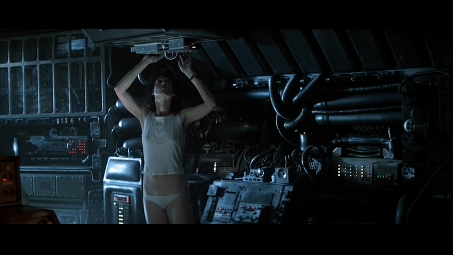
The other night, I showed Alien off to my girlfriend. Regina (who, during her formative years, spent all the time I allotted to movie viewing in fruitless pursuits like “school”) had never seen the film before.
About halfway through, after she jumped at that part where everybody jumps, I came to a conclusion. It’s not very revolutionary, and it’s not nearly what I hoped it would be. But so what? We”re all trapped in a meaningless, nihilistic, Darwinian nightmare anyway, right? If nothing else, the Alien series has taught me that.
So here it is. The Big Conclusion: That Alien is a real classic. That there are damn good reasons it (along with its big brother, Jaws, and little sister, Halloween) have inspired so many sequels, Xeroxes, and cheep knock-offs. That it still has the power to do those things it does so well. That you should all run out and steal it from your nearest Corporate Whore-Mart. That as soon as I’m done coding this, I’m planning to watch it again. And it’s three sequels.
What can I say? Santa was good to me this year.
![]()
![]()
![]()
![]()
![]()

Terrific movie. One of my favourites.
Aliens (which gets a lot of praise) is fun and all, but I think Cameron forever ruined the Xenomorph by turning them into giant ants. Gone is the creepiness of the alien who adapts to its environment and transforms its victims into eggs and hosts. Instead we have an overgrown ant colony. An Alien QUEEN. Wow how interesting…
Part IIs have a tendacy to ruin the first film by explaning everything/too much. Like Halloween II. Why was Michael after Lauire in the first Halloween? Oh she’s really his sister! And Poltergeist II reveals that the angry ghosts weren’t from the desecrated cemetery under the Freelings’ house, but rather from a cavern, containing the remains of an ancient religious cult, located UNDER the desecrated cemetery under the Freelings’ house.
Damn it, sequels. Shut up already!
Agree, agree, agree.
So will you review Star Wars?
Which one?
Episode IV.
If that’s an official request, consider it added to the woodpile. I’ve got several I need to get to as-is and, if I get enough of them together, I can pit them all against each other in a Facebook poll or something similar.
Hi DeMoss. I was 10 when my Aunt snuck me and my cousins into the theater to see this masterpiece. To say I had the shit scared out of me would be an understatement LOL! It truly was a groundbreaker in the horror genre. It’s been endlessly copied, but Alien did the Chestburster first, and it’s still the best with John Carpenter’s The Thing coming a very close second for freaky scenes that catch you unprepared(difibrillator scene, anyone?).
The claustrophobic feel of those dingy darkened ship corridors and the creepiness of that monster that could spring out from anywhere created a really spooky atmosphere that served the film well for creating suspense and tension. Ridley Scott did a phenomenal job directing all the cast that got picked off one by one. H.R. Giger’s Alien designs and Carlos Rambaldi’s Alien head mechanics totally sold the creature as sleek, lethal and nightmarish.
I also really liked the clever decision of making Ash a company android who knew all along what the crew was getting into. That was really sinister, and Ian Holm did a great job executing the character.
I did enjoy the sequel, Aliens by James Cameron, but I draw the line there. Alien 3 and Alien Resurrection took the series in the wrong direction IMHO. I think it was a mistake to kill off Ripley. That kind of defeated the whole spirit of the films that were a testament to the human spirit of survival and Ripley’s general bad assedness overcoming the monsters in spite of the terror she felt. Great review, my friend. Peace.
Hey, ALIEN: ISOLATION inspired me to do a re-watch of this classic (Alien, Aliens), not so classic (Alien 3, Resurrection), and whatever the hell we’re calling Prometheus. I was curious if you ever had an urge to revisit these as I absolutely loved your review of Terminator and would love to see you tackle Alien and the….lesser examples of the franchise.
Your patience will be rewarded…though fair warning: it’ll be a while before I can force myself to watch 3, (No) Salvation and Genisys again. I’m absurdly happy with the fact I had to look up how to spell that last one’s intentionally miss-spelled subtitle. As for a James Cameron retrospective, that idea’s been on the back burner since Avatar…and it’s time to brace myself anyway…<Sean-Bean-as-Ned-Stark> Avatars 2-4 are coming </Sean-Bean-as-Ned-Stark>.
just a note to remind everyone that Alien is directly inspired by “It! The Terror from Beyond Space”
https://en.wikipedia.org/wiki/It!_The_Terror_from_Beyond_Space